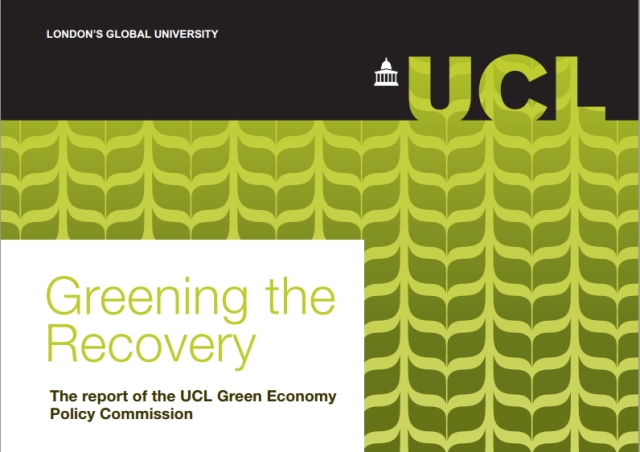A new report from the University College London Green Economic Policy Commission today outlines how a green economic strategy can strengthen the UK economy.

Among the report’s key findings are:
- There is currently a window of opportunity to put the UK economy decisively on a trajectory towards low-carbon prosperity. Resource costs are low, the added benefits of stimulating directed investment are large, and structural reform is required in any case;
- A green economy strategy can strengthen the UK economy by overcoming key structural weaknesses, particularly under-investment in infrastructure and under-performance in innovation. A credible, long-term strategy, supported by environmental tax reform, can thus deliver a more durable recovery while contributing to climate stability, resource security and better environmental quality.
- Government should take a more proactive, strategic approach to driving green innovation. A green industrial strategy can help to secure comparative advantage in key sectors and areas of technology – the UK still has the opportunity to be a leader in many of these areas, but other countries are already seizing the initiative.
The UCL Green Economy Policy Commission (UCL GEPC) included a diverse group of academics with expertise in economics, the built environment, infrastructure finance, political science, innovation, and resource efficiency.
Their report makes the case that green economy policies can address fundamental weaknesses in the UK economy and drive a more robust recovery. They point out that the while there are short term costs in moving to a green economy, these costs are consistently over estimated. There are also economic pay-offs associated with environmental policy and these are frequently ignored. The report refers to Stern Review findings and states:
“Well-implemented global action to mitigate global climate change is cost-effective, with the costs of inaction greatly outweighing the costs of decarbonisation.”
It’s a point that Chair of the UCL Green Economy Policy Commission, Professor Paul Ekins feels is highlighted by the recent floods:
“The recent floods and appalling weather conditions should remind policy makers of the dangers and risks of failing to take action to mitigate environmental threats. The report’s recommendations are intended to enhance the UK’s resource and environmental security, and contribute to the global imperative to reduce greenhouse gas emissions.”
The UCL GEPC clearly believes that a green economy can help drive a competitive advantage in innovation and technology which is necessary for the long term success of the UK economy. The report also highlights the fact that the very fragility of the economic recovery provides a case for making this investment now. Resource costs are low and the benefits of directed investment in infrastructure and innovation are high.
In a world where other countries are moving towards greener innovation, the UK should act to establish and maintain leadership and competitive advantage.
The full report and executive summary are available from the following link:
http://www.ucl.ac.uk/public-policy/Policy_Commissions/GEPC/GEPCreport


